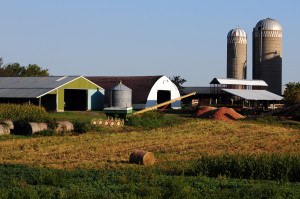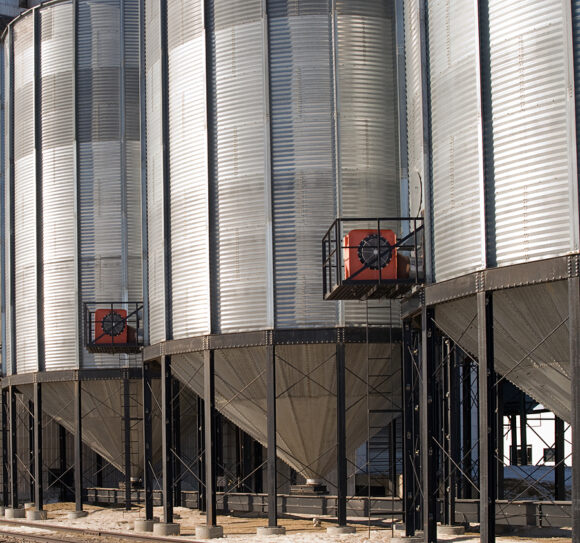Ten central Nebraska teenagers spent Tuesday and Wednesday on the Buffalo County Fairgrounds listening to classroom presentations, doing hands-on activities, and taking written and tractor driving tests as parts of an agriculture safety course.
Although they heard thousands of facts and many true stories about people losing hearing, eyesight, limbs and lives in accidents on farms and ranches, presenter Ellen Duysen summarized the core message in one simple sentence: Don’t be another headline, Kearney Hub reported.
Duysen and Aaron Yoder of the Central States Center for Agricultural Safety and Health in the University of Nebraska Medical Center’s College of Public Health were the primary presenters for the Tractor Safety & Hazardous Occupations Course that is a partnership between UNMC and Nebraska Extension.
The Kearney course was the first of nine such presentations across the state over the next six weeks.
Successful completion by 14- and 15-year-olds provides an exemption from a federal law that prohibits youths younger than 16 from working on a farm or ranch not owned by a parent or guardian. The exemption allows them to drive a tractor and do field work with certain mechanized equipment.
Duysen, the CS-CASH coordinator and outreach specialist, cautioned that other ag-related activities that remain forbidden until age 16 include being around cows or sows with newborns or bulls, touching pesticides, or be on ladders higher than 20 feet.
She and Susan Harris-Broomfield of Minden, Nebraska’s only Extension educator for rural health, wellness and safety, both said targeting early teens for the safety training is important.
“They’re all physically able to drive a tractor, when they might not have been at a younger age. Their maturity level may not allow them to think through all of the hazards involved,” said Harris-Broomfield, a McCook native who joined the Extension staff in Kearney and Franklin counties in August.
Also, she said, the information and hands-on activities presented by the UNMC specialists may make more of an impression on some youths than just hearing the same cautions from their parents or bosses.
 “We know that farming is the No. 1 most dangerous occupation … whatever we can do to make it safer should be done,” Harris-Broomfield said.
“We know that farming is the No. 1 most dangerous occupation … whatever we can do to make it safer should be done,” Harris-Broomfield said.
Safety course topics include tractor mechanics, accident protocol, connecting implements, all-terrain vehicles and general safety threats that require the use of correct personal protective equipment for different conditions and jobs. There is a written exam at the end of the first day and homework assignments.
In addition to passing the exam, the youths must successfully complete a tractor driving test to be certified.
On the UNMC team’s long list of on-the-farm dangers are many involving machinery that can move, grab, cut, pinch, wrap or crush if not turned off when people are around and/or don’t have proper safety covers. Other concerns are heat, thrown objects, contact with electrical lines, livestock, dust and dirt, chemicals and noise.
When Duysen talked about why earmuffs or plugs should be used around loud machinery, several teens said they have older relatives who don’t hear well.
“You can farm your whole life and still be hearing at 60 or 70,” Duysen said, by using ear protection as recommended when spending any amount of time around sounds at 85 decibels or higher. She added that a tractor idle at about 85 decibels.
The same urgency applies to eye protection. “It’s like our ears. We only have two and we can’t risk losing one,” Duysen said.
Working in and around grain bins is another big concern for people of all ages on farms. “There is no excuse to go into a grain bin that is filled … and I would argue that with anybody,” she said.
Both Duysen and Harris-Broomfield said tractor-related accidents (mostly rollovers) account for the highest number of on-farm fatalities, but ATVs are catching up because they are used on farms and ranches every day.
“It’s a trend line. They have become standard on farms,” Duysen said.
Manufacturer recommendations link rider age to ATV horsepower – 70cc, 12 and older, and 90cc, 16 and older – but she said only some states have laws to that effect or for helmet use.
Duysen and Yoder, a UNMC assistant professor specializing in agriculture and occupational health, said the age of a tractor is a factor in many of the worst accidents. It’s a risk that could be reduced by retiring all the mid-1980s and older tractors.
“Folks are just hanging on to them because they last and last,” Duysen said.
As a health and safety specialist, she is extremely concerned about protecting today’s farm youths from future respiratory and hearing problems.
Yoder focuses more on machinery safety issues. He worries most about anything with moving parts, especially when driver-operators are on “either end of the age scale.”
His take-home message for teens taking the Extension-UNMC course is, “Stop and think about the task you’re doing and then what the potential hazards are.” Yoder said that allows time to make plans to avoid hazards and to deal with any problems.
When asked what information made an impression on her, Allison Wilkens, 15, of Gibbon said she learned about tractor safety beyond the basics taught to her by her dad.
However, it was the grain bin safety presentation that really will make her stop and think.
“I actually didn’t know about the grain bins, all the hazards and gases that can be in there,” Allison said. “I didn’t realize how many deaths there were involving a grain bin.”
Alex Bartlett, 14, of Cozad said he learned more about communicating with other workers. “I didn’t know how many different hand signals there were … so you know what to do,” he said.
Was this article valuable?
Here are more articles you may enjoy.


 FM Using AI to Elevate Claims to Deliver More Than Just Cost Savings
FM Using AI to Elevate Claims to Deliver More Than Just Cost Savings  Founder of Auto Parts Maker Charged With Fraud That Wiped Out Billions
Founder of Auto Parts Maker Charged With Fraud That Wiped Out Billions  Hackers Hit Sensitive Targets in 37 Nations in Spying Plot
Hackers Hit Sensitive Targets in 37 Nations in Spying Plot  Why 2026 Is The Tipping Point for The Evolving Role of AI in Law and Claims
Why 2026 Is The Tipping Point for The Evolving Role of AI in Law and Claims 